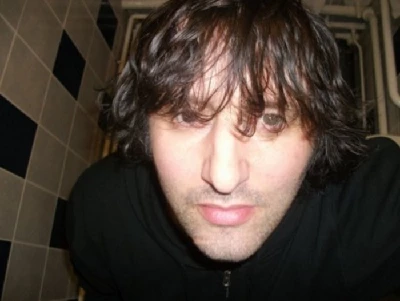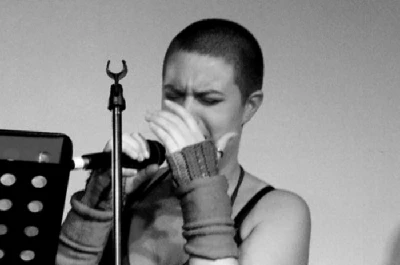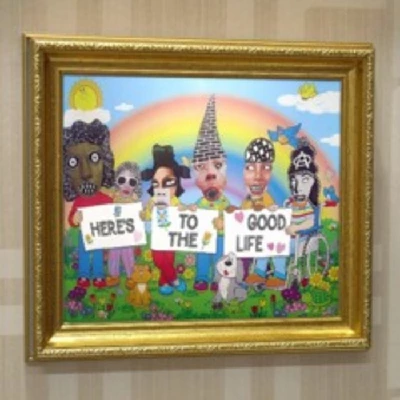published: 6 /
10 /
2010

In what is his second interview with Pennyblackmusic, singer-songwriter, visual artist and stand-up comedian Ashley Reaks speaks to Lisa Torem about his just released new album, 'Here's to the Good Life'
Article
Harrogate’s Ashley Reaks must create. It’s as though a siren rising from a frothy ocean calls to him during his waking hours. The incredible, versatile singer/songwriter/instrumentalist and visual artist pours deep emotion into his work. The imaginary characters he creates visually are odd, bizarre, colourful and supremely unique. His lyrics, whether sweet or scatological, command attention and he is a master at creating mood.
A survey of his discography might lead one to believe that he’s on a mission to find himself. Crossing paths with pop, folk, rock, dub, spoken word and World music, Reaks certainly shows that he’ll never be stuck in a rut, and you also get the impression that “finding himself” would bore him to tears.
‘Here’s to the Good Life’ is his most recent album. When, we first touched base, in 2009, after his release of his last album 'Melancholia', I was impressed with the breadth of his work and curious to see how he could follow-up. His original music still takes centre stage, but he has, wisely, kept on board some of the musicians who helped make 'Melancholia' soar.
Scott Fitzgerald says that action is character. In other words, show don’t tell. Reaks has the enviable ability to bring his characters to life, but it’s done in such a delicate way, you find yourself shaking hands with the players even before the match begins.
PB: It’s been about a year and a half since our last interview. How have things been?
AR: Things have been interesting. I've been through a long-term relationship break-up in the last year which tends to shake things up a bit. I've been creatively well and productive which continues to provide shelter from the storm.
PB: I really enjoyed ‘Melancholia’. But, I feel ‘Here’s To the Good Life’ takes on completely different coloration. Do you see them as two distinct creatures?
AR: Yes. My method in 'Melancholia' was more like how I make art. I find fragments and bits that interest me and collage them together randomly until I like the fit. I don't know what I'm making until it's finished. 'Here's To the Good Life' has more crafted songs, written on the guitar with traditional pop structures (verse/chorus etc). One breaks the rules and one follows the rules.
PB: So many songwriters rely on collaborators at a certain point in their career. Why have you chosen to write primarily by yourself? Does it ever get difficult?
AR: The need to express my inner world is like a compulsion for me so I prefer to create on my own. Ultimately it's where I am revealed to myself. I have a history of being disconnected from myself and art and music help me re-connect. It doesn't get difficult; In fact it's quite the opposite. I find it difficult to give voice to myself in real life so I'm never short of creative raw material. I've heard it said that "art is the shy person's revenge on the world." I agree!
PB: The album is loaded with poignant character studies. I think you’ve really captured the art of sculpting a real human being through imagery.
AR: Thanks. I am endlessly fascinated by people. Most of my songs and art are overflowing with characters. I think it comes from an emotional loneliness from way back when. I create imaginary worlds and people to keep me company.
PB: There seems to be a healthy balance of male versus female, too. Can you just as easily imagine the feelings of a woman than of a man?
AR: Interesting question. I think as humans we have male and female qualities inside us all to varying degrees. The softer and more emotionally literate part of me is what's traditionally thought of as 'female'. Maybe I write about women more when I'm in that place myself.
PB: ‘Elizabeth’s Loneliness’ comes off as very earnest and genuine. These lines,“She’s playing Kung Fu with her shadow/She’s wrestling with the demons of her past” help make it a very visceral experience.
AR: Elizabeth's Loneliness' is my favourite song on the album. Sometimes it's hard for me to write a sincere song without my shadow coming in and hijacking it!
I think we (well, certainly I do) often disown our shadow side and try to eliminate it rather than accepting it as part of being human. We all have a God and a Devil inside of us even though the ego doesn't want anyone to know that.
PB: What other songs about women have inspired you to write?
AR: I can think of some songs about women I like:
John Lennon - ' Mother', 'Julia' 'Dear Prudence’
Joni Mitchell – 'Amelia'
Steely Dan - 'Josie'
Prefab Sprout - 'Bonny'
The Jam – 'English Rose'
The Cure 'Charlotte Sometimes'
The Velvet Underground - 'Sweet Jane'
The Beach Boys - 'Caroline, No'
The Clash - 'Janie Jones'
Leonard Cohen - 'Suzanne'
PB: I notice you used one of your original paintings for the cover art, but you didn’t give yourself credit on the album. Are you trying to keep your life as an artist and as a musician separate at this point? Do you prefer one art form over the other?
AR: I forgot to give myself a credit for the cover art. Old habits die hard! I don't keep art and music separate. I like the rawness and lack of technique I have as an artist. It keeps it exciting for me. I have more ability as a musician and have pre-conceived ideas of how I want things to sound which can make it a more frustrating process. Music is my great love, however.
PB: I see that Maria Jardardottir is working with you again and that you’ve also added another vocalist, Lucy Mizen.
AR: Maria did 90% of the female vocals. She's such a gifted vocalist and a lovely person. I could happily sit and watch her sing for hours. Lucy is one of three of the Mizen family on the record. Her husband Dan recorded and co-produced the album at his studio in my home town of Harrogate in Northern England.
His multi-instrumentalist dad Frank played a plethora (nice word) of instruments – guitar, keyboards, banjo, pedal steel, ukulele amongst them. Many moons ago he played bass on party favourite 'Kung Fu Fighting' and also played trombone for the Jacksons in the 70's. He's a very talented man!
PB: How did you approach working with the vocalists in the studio?
AR: On this album I had virtually everything mapped out beforehand apart from Maria's mournful improvisation at the end of 'Monster of Suburbia'. Both Maria and Lucy are so musical that I would sing them the parts and they'd record it straight away. Maria had never heard the songs before, yet it was done and dusted in a few short hours.
PB: Also, Jardardottir does an excellent job of providing a kind of improvisational flourish. Was her contribution improvised or had you worked it out together before recording?
AR: Maria naturally leans towards improvisation. She writes and records her own music and plays in many groups. She's a joy to work with. She has a website and a MySpace where you can hear some of her music. (http://www.myspace.com/mariajardardottir)
PB: ‘Monster of Suburbia’ is chilling. “He’s got little white holes where his eyes used to be…” And, it appears that the bloke gets more smug and insular as the song progresses. What hasn’t changed, since ‘Melancholia,’ is that you still seem to abhor social convention and people who subscribe to it. Is that true?
AR: I don't know if I abhor the people who subscribe to social convention, but I do rebel against the convention itself. From being a young boy I was someone who questioned "the rules" and thought and still think, that a lot of it is designed to control the masses, and ultimately, me. The freedom to be my real self drives me onwards and upwards (and sometimes sideways and downwards). I was a punk rocker you know!
PB: Ah, I should have guessed! Was ‘Monster of Suburbia’ based on a particular person?
AR: 'Monster of Suburbia' was a newspaper headline about serial killer, Dennis Rader, who killed ten people in Wichita between 1974 and 1991. I tried to get into the mind of someone whose reason to live was to end people's lives, the extreme need to control others and the spiritual meanness inherent in this. I also liked the idea of suburbia itself and its illusions of comfort and safety being a monster that'll get you in the end.
PB: How much control did you have over the production of the album and were you satisfied with the results?
AR: I co-produced the album with Dan Mizen. On this record I consciously let go of (some!) control and wanted other's input in the arrangements and particularly the sound of the record. Dan did a great job. He let the songs breathe and created the sense of warmth and intimacy I was after. I am happy with it. I like the melancholy, yet hopeful feel of the record.
PB: ‘Brother Joe’ and ‘She Left Me for Dead’ are intriguing, though the themes are dark. Your albums have shown a lot of experimentation along these lines.
AR: 'Brother Joe' is based on a true story about a girl who was sexually abused by her pastor father - (http://www.sullivan-county.com/nf0/combs/). I read the story in a Sunday magazine and was moved to find out more about the case and write a song about it. It's a shocking, yet sadly all too familiar story about abuse happening to vulnerable people in places that appear to be caring.
'She Left Me for Dead' is a true and exaggerated account of my litany of failed intimate relationships. I should write an extra verse to include the last one now!
PB: Your album ‘Children Rule’from 2003 was lighter and, of course, there were those poppy years you spent with your former Younger Younger 28.
AR: 'Children Rule!' and especially Younger Younger 28's 'Soap' album were certainly poppier affairs musically but still had dark themes in the lyrics. 'Soap' especially was concerned with small-town hopelessness and broken dreams, and the often-thwarted desire to transcend that life. That it was set to an ultra electro-pop sound only made it more desperate to me. It was like the make-up we pile on to hide the hurt in our eyes.
PB: Has each album helped you define yourself in a meaningful way?
AR: I think so. I trust the process of creativity. Art mirrors where I am in my own life and helps me see myself more clearly, including the parts I'd rather not.
PB: Do you have additional recording projects in mind?
AR: I'm already 80% of the way through a new album which is the natural follow up to 'Melancholia', a collection of computer-based songs made from odd riffs, loops, melodies, beats, dubby soundscapes and poetry; a sort of organized chaos.
Also I'm soon recording a set of old-school punk songs I've had around for a while called 'Freaks of the World Unite'. Punk was my first big musical love. The Ramones live album 'It's Alive' was what inspired me to pick up a guitar in the first place.
PB: ‘In the Rubbish Bin’ balances the serious tone of the other ballads with some levity. It could be the background for a cartoon. How did you write this one?
AR: I wrote 'In the Rubbish Bin' in the early 90's. I've always liked the song and seeing as though I had the brass section available I thought it was the perfect opportunity to record it. I seem to remember I was inspired by a Prefab Sprout song from the 'Protest Songs' album, but I can't remember the name of it.
PB: There are some duets on the album, too. Did you enjoy that experience?
AR: I love singing with other people. It's a beautiful thing. It's taken me years to get the confidence to sing and now I enjoy it more than anything. There's something primal and instinctive about communal singing whether it be at church, a rock concert or a football match. It makes me feel good.
PB: What are your current touring plans? Are you gearing up for some major label attention?
AR: Unfortunately gigging is a low-key affair for me these days due the logistics of musician's availability and reality getting in the way. I'm thinking of ways round this and hope to gig more often.
Major label attention? That would be nice! However, apart from the fact that the record industry isn't the force it once was, I also found in my short time in 'the biz' that I didn't fit there. I was unwilling and incapable of playing the game and found it immensely stifling creatively. I would love to find a small label that believed in me and could help me put my music out to more people, but in the meantime I'll just keep making music.
PB: Ashley, what’s the most important advice you’ve ever received?
AR: A cliché I know but probably "To thine own self be true"
I also like "Enlightenment is progressive disillusionment" from the Buddha.
PB: Have you followed it?
AR: Sometimes I do and sometimes I don't!
PB: Thanks, Ashley.
Band Links:-
http://www.ashleyreaks.com/
https://twitter.com/ashleyreaks
http://ashleyreaks.bandcamp.com/
https://www.facebook.com/ashleyreaksar
https://www.instagram.com/ashleyreaks/
https://www.youtube.com/user/ash231266
Have a Listen:-
Picture Gallery:-

